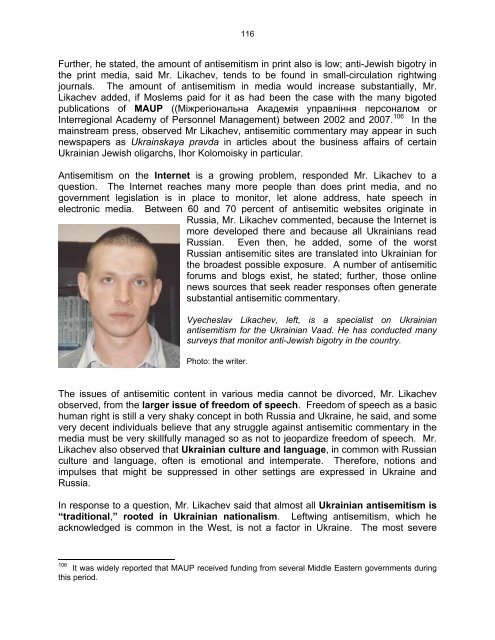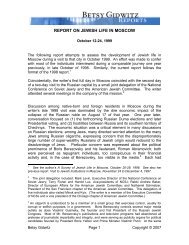(Dnipropetrovsk, Kharkiv, Krivoi Rog, Donetsk, and Kyiv) Report of a ...
(Dnipropetrovsk, Kharkiv, Krivoi Rog, Donetsk, and Kyiv) Report of a ...
(Dnipropetrovsk, Kharkiv, Krivoi Rog, Donetsk, and Kyiv) Report of a ...
You also want an ePaper? Increase the reach of your titles
YUMPU automatically turns print PDFs into web optimized ePapers that Google loves.
116<br />
Further, he stated, the amount <strong>of</strong> antisemitism in print also is low; anti-Jewish bigotry in<br />
the print media, said Mr. Likachev, tends to be found in small-circulation rightwing<br />
journals. The amount <strong>of</strong> antisemitism in media would increase substantially, Mr.<br />
Likachev added, if Moslems paid for it as had been the case with the many bigoted<br />
publications <strong>of</strong> MAUP ((Міжрегіональна Академія управління персоналом or<br />
Interregional Academy <strong>of</strong> Personnel Management) between 2002 <strong>and</strong> 2007. 106 In the<br />
mainstream press, observed Mr Likachev, antisemitic commentary may appear in such<br />
newspapers as Ukrainskaya pravda in articles about the business affairs <strong>of</strong> certain<br />
Ukrainian Jewish oligarchs, Ihor Kolomoisky in particular.<br />
Antisemitism on the Internet is a growing problem, responded Mr. Likachev to a<br />
question. The Internet reaches many more people than does print media, <strong>and</strong> no<br />
government legislation is in place to monitor, let alone address, hate speech in<br />
electronic media. Between 60 <strong>and</strong> 70 percent <strong>of</strong> antisemitic websites originate in<br />
Russia, Mr. Likachev commented, because the Internet is<br />
more developed there <strong>and</strong> because all Ukrainians read<br />
Russian. Even then, he added, some <strong>of</strong> the worst<br />
Russian antisemitic sites are translated into Ukrainian for<br />
the broadest possible exposure. A number <strong>of</strong> antisemitic<br />
forums <strong>and</strong> blogs exist, he stated; further, those online<br />
news sources that seek reader responses <strong>of</strong>ten generate<br />
substantial antisemitic commentary.<br />
Vyecheslav Likachev, left, is a specialist on Ukrainian<br />
antisemitism for the Ukrainian Vaad. He has conducted many<br />
surveys that monitor anti-Jewish bigotry in the country.<br />
Photo: the writer.<br />
The issues <strong>of</strong> antisemitic content in various media cannot be divorced, Mr. Likachev<br />
observed, from the larger issue <strong>of</strong> freedom <strong>of</strong> speech. Freedom <strong>of</strong> speech as a basic<br />
human right is still a very shaky concept in both Russia <strong>and</strong> Ukraine, he said, <strong>and</strong> some<br />
very decent individuals believe that any struggle against antisemitic commentary in the<br />
media must be very skillfully managed so as not to jeopardize freedom <strong>of</strong> speech. Mr.<br />
Likachev also observed that Ukrainian culture <strong>and</strong> language, in common with Russian<br />
culture <strong>and</strong> language, <strong>of</strong>ten is emotional <strong>and</strong> intemperate. Therefore, notions <strong>and</strong><br />
impulses that might be suppressed in other settings are expressed in Ukraine <strong>and</strong><br />
Russia.<br />
In response to a question, Mr. Likachev said that almost all Ukrainian antisemitism is<br />
“traditional,” rooted in Ukrainian nationalism. Leftwing antisemitism, which he<br />
acknowledged is common in the West, is not a factor in Ukraine. The most severe<br />
106<br />
It was widely reported that MAUP received funding from several Middle Eastern governments during<br />
this period.



